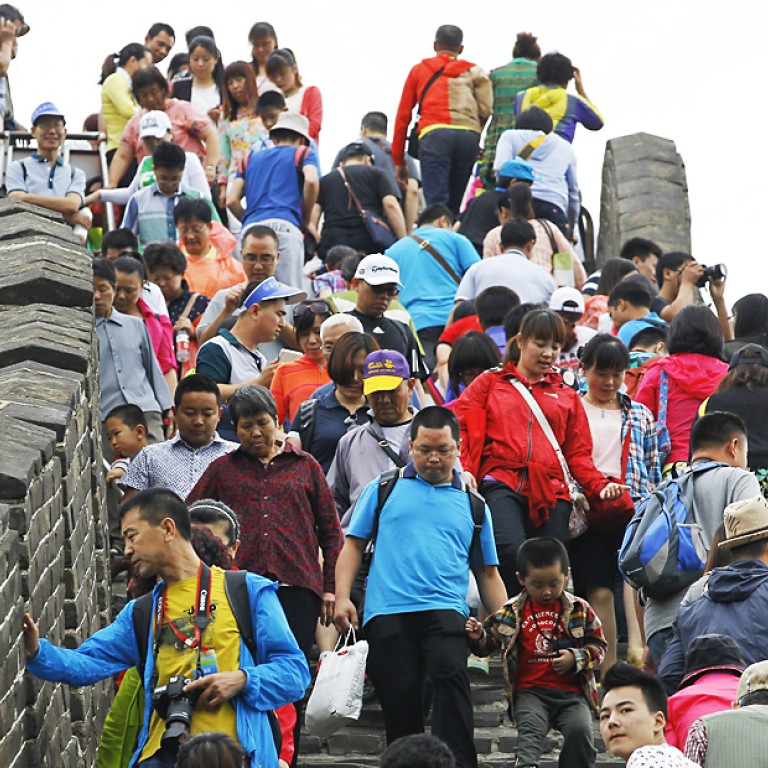
Channel mainland tourism, don’t shut it off
The vitriol against mainland tourists is ugly and misplaced, given that HK has benefited the most from the explosion of wealth across the border
I think I am not alone in being embarrassed and not a little ashamed by the strident, hysterical and xenophobic tone of much of the recent debate over mainland tourists in Hong Kong.

But the tone and logic of many of the recent anti-visitor outpourings have been embarrassing to hear. And the policy proposals in response - mulling restraints on inbound tourism from the mainland - have been as spineless as they are likely to be ineffective.
For most Hong Kong people, [the mainland’s rise] is the best thing that has happened to us
Don't get me wrong - I am as appalled as anyone by the uncouth and antisocial behaviour of some visitors that we have witnessed in recent months. I also concede that the velocity of growth of visitors from the mainland has put huge pressures on our infrastructure. But the hysterical anti-mainland outpourings are ugly, unjustified and misconceived.
First, we should remember how recently such prejudices were pointed at us. I remember with embarrassment the nastinesses directed at Japanese or Hong Kong tour groups herding noisily around London in the 1980s.
Tour groups are invariably not a pretty sight, and they can cause negative ripples wherever they turn. But Hong Kong people - and many from Southeast Asia - have moved on. They are more sophisticated tourists, travelling alone or in small groups. They speak English and other foreign languages, understand and respect foreign customs and are willing to experiment with unfamiliar cuisines.
In time, the same will happen with international travellers from the mainland - many millions of whom are peeking for the first time at the outside world when they arrive in Hong Kong.
But more important, we should remember that emerging affluence across the mainland and China's steady integration with the rest of the world after many decades of isolation are, for most Hong Kong people, the best thing that has happened to us in our lifetimes.
China's opening up has brought massive stimulus and huge benefits to the entire global economy - and nowhere have these benefits cascaded more prodigiously than here in Hong Kong. As China's gross domestic product has exploded 80-fold between 1978 and today, from US$188 billion to US$14.8 trillion, rising from less than 1 per cent of global GDP to almost 16 per cent today, no community has benefited more than Hong Kong.
China's exports - a mere US$21 billion in 1978 - have soared 200-fold to more than US$4 trillion, with much of this trade managed through Hong Kong. The reality is that China's extraordinary emergence is reshaping the global economy, and creating uncomfortable transformations for everyone, everywhere.
The shock waves may be more powerful here, but they are no less significant in Europe or the United States or Latin America as they reshape our world.
China's tourism boom is but one manifestation of this - and this boom is just in its infancy. Our challenge is not to build a wall against it but to channel it as fluently as we can.
For a measure of the sheer scale of the tourism tsunami that will in the coming years break over the world's tourism markets, it is good to start by looking at home.
It may seem awesome that over 97 million overseas trips were made last year by mainland travellers - but domestic tourists made a giddy total of 2.5 billion trips - up from 1.4 billion in 2007. If we think Hong Kong is being deluged, imagine the impacts in cities like Guilin, Xian or Lijiang.
At present, the giant majority of mainland travellers target Hong Kong and Macau for their first overseas holiday, and the growth rate is awesome - a fivefold increase in visitors to Hong Kong between 2003 and last year, and a threefold increase to Macau. But the impact on other regional tourism destinations is equally remarkable: mainland visitors to Korea and to Thailand are up more than sevenfold in the past decade, for example. From a smaller base, visitors to Malaysia are up fourfold, and up ninefold to Taiwan.
And in every one of these economies, mainland Chinese visitors now account for the majority of their foreign tourists - 38 per cent in Korea, nearly 18 per cent in Thailand, and 36 per cent in Taiwan.
Even in Japan - where arguments over rocks in the Pacific have soured bilateral relations - Chinese are the single largest group of overseas visitors.
And if there were almost 100 million mainlanders travelling overseas last year, then the forecast is for this to pass 200 million before 2020.
Already China is the world's No1 source of tourists, and their spending - US$129 billion last year - leads the world and has risen 10-fold since 2000.
Amid all of the xenophobic whingeing, this fact above all else should be remembered: no economy in the world has benefited so massively from China's opening up and from the surge in international tourism that has accompanied it than Hong Kong. We should not be shutting it off. We should be channelling and encouraging it. Many future jobs in Hong Kong, and much of our wealth, will depend on it.

